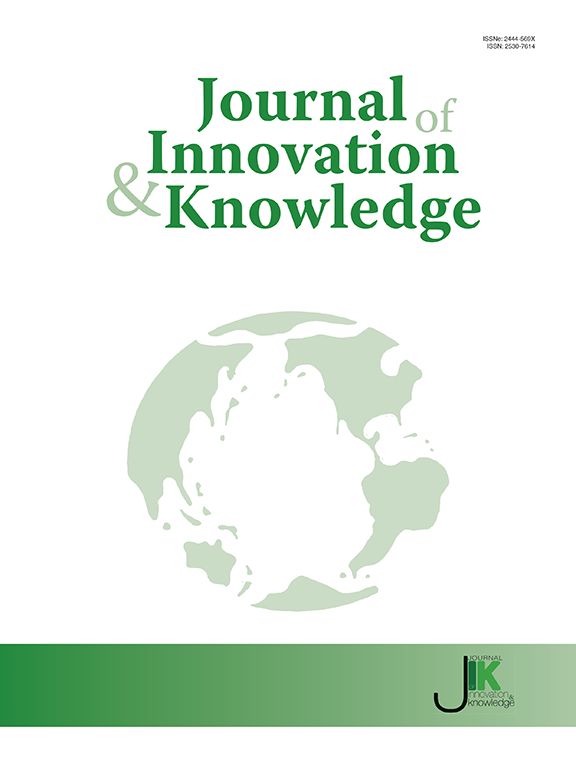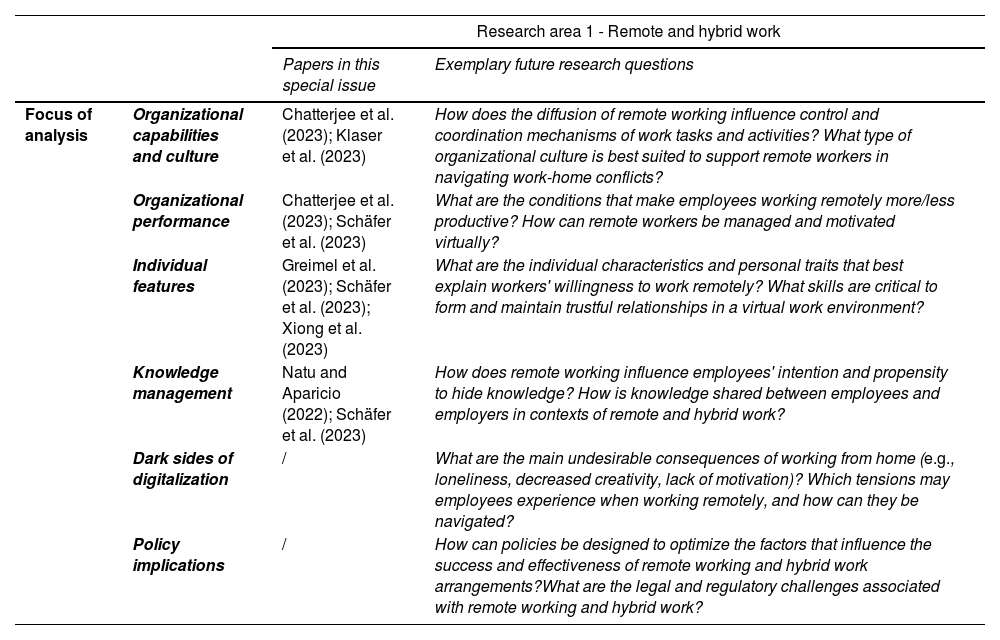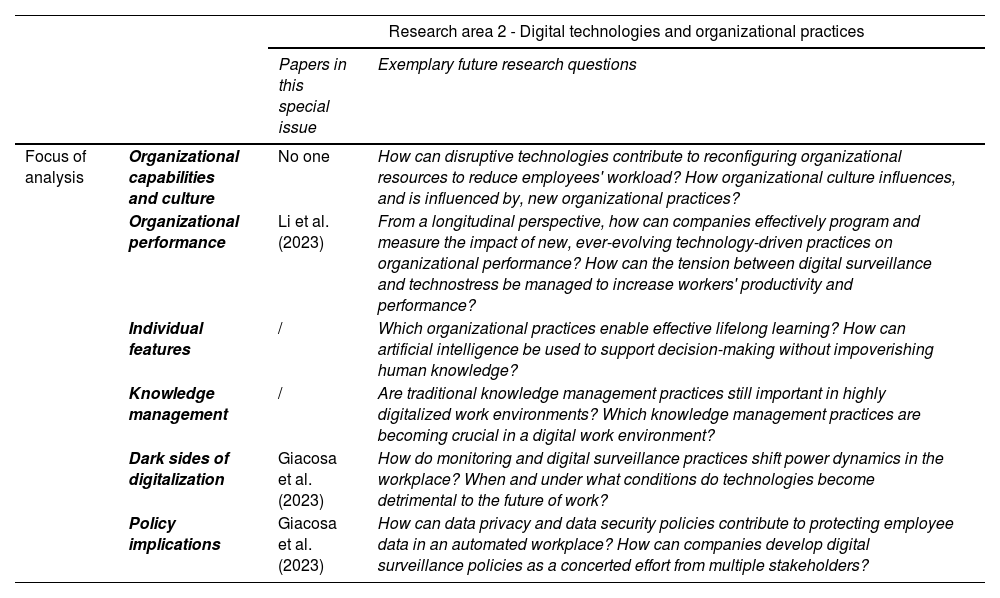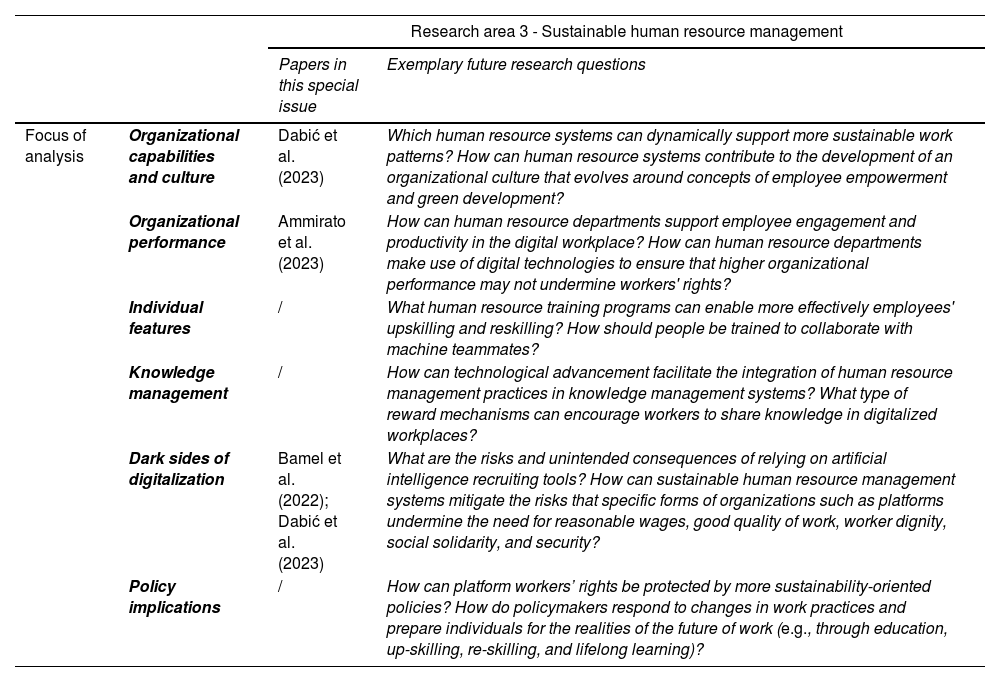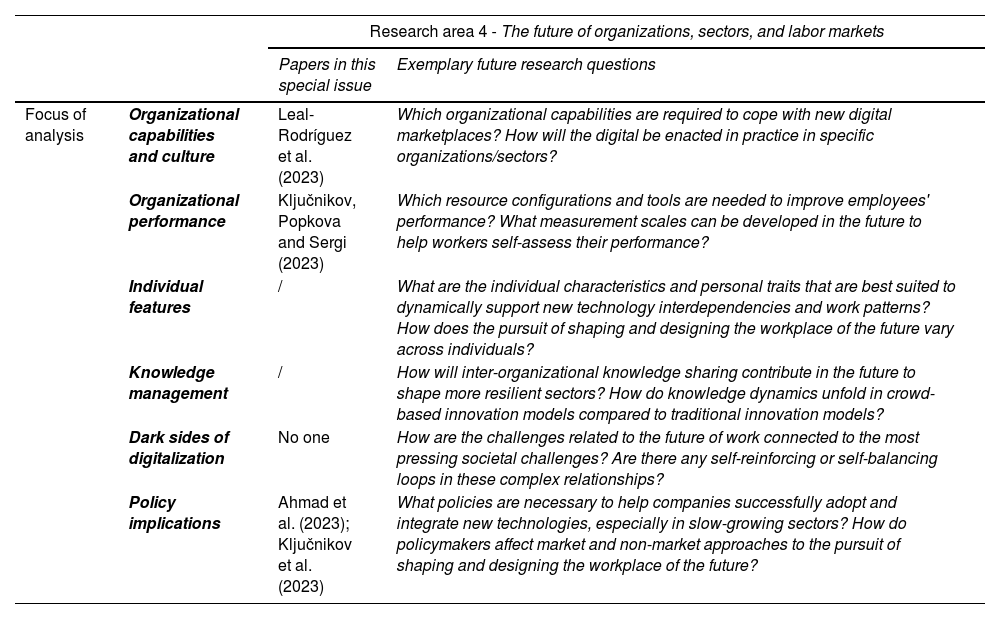Research into the "future of work" has become a central concern of scientists, experts and political decision-makers. This special issue addresses this topic and brings together 14 contributions from the fields of business and management. These articles offer new perspectives on the broad scientific landscape surrounding the future of work. The accepted manuscripts are organized into four primary research areas (remote and hybrid work, digital technologies and organizational practices, sustainable human resource management, and the future of organizations, sectors, and labor markets) and six thematic areas (organizational capabilities and culture, organizational performance, individual features, knowledge management, the dark sides of digitalization, and policy implications). The resulting framework serves as the basis for identifying illustrative research questions to guide future research on the future of work.
The inquiry into the “future of work” has emerged as a pivotal concern for both scholars and industry practitioners within the domain of business and management. Consider, for instance, ChatGPT, the language model, which has incited fervent discussions. Its potential integration into academia (e.g., Burger et al., 2023; Dwivedi et al., 2023) is a matter of considerable interest. Irrespective of the perspective applied, whether it be utopian or dystopian (Griffy-Brown et al., 2018), it is irrefutable that prototypes of artificial intelligence chatbots hold the potential to disrupt academia and its future working landscape. To hypothesize, should ChatGPT become an integral reference tool in educational institutions, it could profoundly reshape the academic terrain (e.g., Rudolph et al., 2023). This transformation carries dual implications. On one hand, students would gain streamlined access to extensive, well-structured information, which could be advantageous. Conversely, there is the risk of students overly depending on the automatic generation of new knowledge content without honing their critical thinking abilities. Simultaneously, educators would be compelled to reevaluate their pedagogical methodologies and student assessment techniques. Therefore, after grappling with the widespread adoption of remote learning necessitated by the COVID-19 pandemic (Abumalloh et al., 2021), academia may once again confront disruption stemming from technological advancements. Informed by this example, it can be posited that the landscape of work is in a perpetual state of flux.
Artificial intelligence, robotics, and automation have exerted substantial impacts on corporate strategies, governance structures, organizational culture, and labor relations (Frey & Osborne, 2017; Lebovitz et al., 2022; Rubery et al., 2018; Verhoef et al., 2021). Additionally, the COVID-19 outbreak has expedited digital transformation processes (Fletcher & Griffiths, 2020; Kraus et al., 2020; Tajvidi & Tajvidi, 2020), ushering in profound alterations, which are intertwined with narratives regarding globalization and sustainable development (George & Schillebeeckx, 2022; George et al., 2021; Skare & Soriano, 2021). Disruptive technological advances wield significant influence over a spectrum of inter-organizational practices, power dynamics, business strategies, and societal institutions, including labor markets and education and training systems (De Bernardi et al., 2020; Muzio et al., 2020; Rialti et al., 2022; Zhiyong et al., 2023). It is evident that firms' competitive advantages hinge not solely on their ability to adapt continuously to innovative technologies through the development of new routines, capabilities, and technological interdependencies (Bertello et al., 2021; Neufeind et al., 2018; Warner & Wäger, 2019) but also, as underscored by prominent business-focused surveys (e.g., McKinsey Global Institute, 2017, 2020), on their endeavors to align strategies with the extant skill sets of their workforce. This entails providing targeted reskilling and upskilling programs, along with effective human resource management (Bresciani, Huarng, Malhotra & Ferraris, 2021).
For instance, knowledge work is increasingly being conducted within virtual realms, precipitating shifts in work dynamics (Malhotra, 2021). This transformation extends to HR-related practices encompassing aspects such as employee selection, motivation, development, and retention (Kudyba et al., 2020). Key themes like wage disparity, telecommuting, talent management, employee satisfaction, careers, employment, and innovation pertain not only to technological facets but also encompass broader social, economic, and political dimensions (Papazoglou, 2023; Santana & Cobo, 2020). Consequently, the future of work is contingent upon the adaptive responses of individuals and organizations to emerging technological landscapes (see Bednar & Welch, 2020 or Schäfer et al., 2023). This necessitates coordination across various strata and boundaries, including regulatory bodies and educational institutions.
In inaugurating this Journal of Innovation & Knowledge (JIK) Special Issue, we adopted an inclusive approach, inviting authors to contribute to the burgeoning body of literature on the future of work. We solicited reflections that spanned diverse research avenues, comprising information systems and human-machine interaction, strategy and innovation, knowledge management, and corporate sustainability (Bertello, Bogers & De Bernardi, 2022; López-Cabarcos et al., 2020; Wendt et al., 2022). Furthermore, we encouraged contributions at varying analytical levels, encompassing micro-level inquiries designed to explore the requisite skills for navigating digital business environments and marketplaces, meso‑level investigations concentrating on novel organizational structures and resource configurations in the context of the ongoing digital revolution, and macro-level examinations aimed at discerning how policies influence organizational behavior and human resource management in scenarios characterized by disruptive technological advancements (Aguinis et al., 2022; Al-Omoush et al., 2021; Bertello, De Bernardi, Ferraris & Bresciani, 2022; Bresciani, Ferraris, Romano & Santoro, 2021).
Contributions of this issue and research agenda on the future of workThe special issue comprises 14 contributions. These articles offer fresh insights into the extensive scholarly domain pertaining to the future of work. Consequently, it is possible to delineate specific areas of contribution within this special issue. The accepted manuscripts are categorized into four primary research domains: (1) remote and hybrid work (six papers), (2) digital technologies and organizational practices (two papers), (3) sustainable human resource management (three papers), and (4) the future of organizations, sectors, and labor markets (three papers).
Authors have examined these four research areas by framing their analyses within one or more of six thematic domains: organizational capabilities and culture, organizational performance, individual features, knowledge management, dark sides associated with digitalization, and policy implications. These thematic classifications are detailed in Tables 1 to 4. Additionally, these tables include illustrative research questions intended to drive future research on the future of work.
Research area: Remote and hybrid work.
| Research area 1 - Remote and hybrid work | |||
|---|---|---|---|
| Papers in this special issue | Exemplary future research questions | ||
| Focus of analysis | Organizational capabilities and culture | Chatterjee et al. (2023); Klaser et al. (2023) | How does the diffusion of remote working influence control and coordination mechanisms of work tasks and activities? What type of organizational culture is best suited to support remote workers in navigating work-home conflicts? |
| Organizational performance | Chatterjee et al. (2023); Schäfer et al. (2023) | What are the conditions that make employees working remotely more/less productive? How can remote workers be managed and motivated virtually? | |
| Individual features | Greimel et al. (2023); Schäfer et al. (2023); Xiong et al. (2023) | What are the individual characteristics and personal traits that best explain workers' willingness to work remotely? What skills are critical to form and maintain trustful relationships in a virtual work environment? | |
| Knowledge management | Natu and Aparicio (2022); Schäfer et al. (2023) | How does remote working influence employees' intention and propensity to hide knowledge? How is knowledge shared between employees and employers in contexts of remote and hybrid work? | |
| Dark sides of digitalization | / | What are the main undesirable consequences of working from home (e.g., loneliness, decreased creativity, lack of motivation)? Which tensions may employees experience when working remotely, and how can they be navigated? | |
| Policy implications | / | How can policies be designed to optimize the factors that influence the success and effectiveness of remote working and hybrid work arrangements?What are the legal and regulatory challenges associated with remote working and hybrid work? | |
While research on remote working, often referred to as "telework", "distance work", or "smart working" has been a recurring theme in the realm of management and organizational studies (Bailey & Kurland, 2002; Gupta et al., 1995; Nilles, 1975), it was the onset of the COVID-19 pandemic, accompanied by mandatory social distancing measures, that elevated working from home to a commonplace practice across the majority of organizations. This paradigm shift has posed challenges to existing structures, processes, and coordination mechanisms. Among the 14 papers featured in this special issue, six delve into this topic, establishing research on remote and hybrid work as a prominent focal point for scholars examining the future of work (see Table 1).
In their paper, "When Will Employees Accept Remote Working? The Impact of Gender and Internet Skills“, Xiong et al. (2023) explore the determinants of employees' willingness to embrace remote working, with a specific focus on individual features, notably gender and Internet skills. Leveraging historical data, the authors reveal that both female employees and those possessing advanced Internet skills are more inclined to embrace remote work. Furthermore, the analysis of the influence of perceived benefits on employees' acceptance of remote working indicates that women's preference for remote work is rooted in gender-related psychological distinctions rather than familial division of labor.
Motivational aspects of working in virtual teams take center stage in the article titled "Virtual Teams and Transformational Leadership: An Integrative Literature Review and Avenues for Further Research" by Greimel et al., and Chelaru (2023). Their work identifies and synthesizes existing research to offer a comprehensive perspective on motivating virtual teams through transformational leadership. The study also pinpoints areas requiring additional exploration, shedding light on potential research directions concerning geographical team dispersion, leadership diversity, and motivation and trust.
Another article underscores the pivotal role of leadership. In "Digital Workplace and Organization Performance: Moderating Role of Digital Leadership Capability“, Chatterjee et al., and Giovando (2023) investigate the impact of the digital workplace on organizational performance, with a particular focus on the moderating influence of digital leadership capability in the process of digital workplace transformation. Their findings highlight the substantial and positive impact of organizational dynamic capabilities on digital workplace transformation, subsequently enhancing employees' work-life balance and, in turn, contributing to improved employee and organizational performance. The study also underscores the significant role played by digital leadership in driving digital workplace transformation.
Digital workplaces also form the core of the work co-authored by Natu and Aparicio (2022). In their paper, "Analyzing Knowledge Sharing Behaviors in Virtual Teams: Practical Evidence from Digitalized Workplaces“, the authors employ a combination of literature review and structural equation modeling to construct and subsequently test a research model delving into the dynamics of knowledge sharing within virtual teams involved in the software development process. Their findings suggest that individuals primarily engage in knowledge sharing to satisfy their psychological needs. However, organizational culture also emerges as a pivotal factor influencing knowledge sharing.
Efforts to comprehend how the post-pandemic landscape will influence economic and organizational phenomena have led Klaser et al., and Casari (2023) to co-author the paper, "The Future of Hybrid Work in Italy: A Survey-Based Socio-Technical-System Analysis." This study adopts a socio-technical system framework to scrutinize whether and how organizations are preparing for future scenarios that may include hybrid forms of work. The primary results indicate that, despite nearly 40% of the surveyed companies having a dedicated manager or department tasked with promoting, enhancing, and managing hybrid and remote work, only around 20% activate a manager or department focusing on work-life balance or psychological support services. This suggests that the transition toward sustainable hybrid work practices is still in its nascent stages in Italy.
Lastly, Schäfer et al. (2023) co-authored the paper titled "Alternative Workplace Arrangements: Tearing Down the Walls of a Conceptual Labyrinth"1 with a threefold objective: (a) to investigate the diverse conceptualizations and terminologies employed in the analysis of workplace arrangements, (b) to analyze the outcomes of individual research streams, identifying areas of overlap and differentiation, and tracing interconnections, and (c) to delineate future research directions for individual research streams and the broader field.
The recent surge in the massive adoption of remote working across organizations driven by COVID-19 has ignited excitement among management and organization scholars. Studies have sought to uncover new insights into the individual and organizational factors influencing remote work acceptance, the impact of remote work on individual and collective performance, the coordination and knowledge management dynamics within virtual teams, as well as the negative repercussions of working from home and potential policies to improve remote workers' conditions. Table 1 also presents exemplary research questions to encourage further exploration of remote and hybrid working. Of particular interest, in our view, is the investigation of whether and how working from home may lead employees to withhold, hoard, or undermine knowledge (Anand et al., 2022; Choudhary & Mishra, 2023). We also invite scholars to explore the adverse consequences and tensions experienced by remote workers (e.g., feelings of isolation and diminished motivation versus the benefits of independence and work-life balance) and how these challenges can be addressed both at the individual and organizational levels.
Digital technologies and organizational practicesEmerging technologies, including artificial intelligence, 3D printing, blockchain, and augmented reality, are catalysts for innovative organizational methods (Endres et al., 2022; Zirar, 2023). The preceding example of ChatGPT, briefly discussed in the introduction, serves as a meaningful illustration of how a language model could potentially disrupt academia and the roles of professors. Similarly, companies are continually tasked with reconfiguring their production, distribution, and commercialization procedures in an increasingly digitalized environment. This necessitates an examination of how the proliferation and integration of new digital technologies challenge established routines and organizational practices.
In their paper titled “How Does Artificial Intelligence Impact Human Resources Performance? Evidence from a Healthcare Institution in the United Arab Emirates”, Li et al., and Schiavone (2023) center their investigation on the influence of artificial intelligence tool implementation on human resource management practices and performance within healthcare organizations. Specifically, their study delves into the repercussions of incorporating AI-based digital solutions on human resources performance in healthcare facilities. The research reveals that the advantages of artificial intelligence outweigh the associated investment costs. Notably, operational tasks such as attendance monitoring, screening, onboarding, and various administrative duties including employee compensation and benefits administration can be partially or wholly automated through artificial intelligence. This automation provides human resources personnel with the opportunity to focus on more strategic endeavors. According to the authors, digital innovation and technological advancements can enable organizations in the healthcare sector to achieve improved economic and financial outcomes by enhancing productivity, employee retention, and overall satisfaction, while concurrently diminishing repetitive tasks and workplace hazards.
Addressing surveillance practices within digital work environments, Giacosa et al., and Crocco (2023) undertake a critical systematic literature review to scrutinize literature pertaining to digital surveillance. Their study, titled "Stress-Inducing or Performance-Enhancing? Safety Measure or Cause of Mistrust? The Paradox of Digital Surveillance in the Workplace“, identifies three primary thematic areas through content analysis: the impact of digital surveillance on technostress, the relationship between digital surveillance and performance, and the ways in which digital surveillance can influence trust and acceptance. These thematic areas are also employed to delineate avenues for future research, further exploring the contentious and contradictory nature of digital surveillance.
Informed by the insights garnered from the papers in our special issue and the broader body of existing literature on this subject, Table 2 includes illustrative research questions that may serve as pathways for future research. Specifically, we encourage scholars to investigate how disruptive technologies like artificial intelligence can facilitate the development of fresh organizational methods aimed at reducing employee workloads and elevating the value of human knowledge, rather than stifling it. Furthermore, we invite further inquiries to comprehend, from a human-machine interaction perspective, the evolving dynamics within the discipline of knowledge management. Moreover, considering policy implications, it becomes increasingly pertinent to assess how data privacy and security policies can contribute to safeguarding employee data in an automated workplace.
Research area: Digital technologies and organizational practices.
| Research area 2 - Digital technologies and organizational practices | |||
|---|---|---|---|
| Papers in this special issue | Exemplary future research questions | ||
| Focus of analysis | Organizational capabilities and culture | No one | How can disruptive technologies contribute to reconfiguring organizational resources to reduce employees' workload? How organizational culture influences, and is influenced by, new organizational practices? |
| Organizational performance | Li et al. (2023) | From a longitudinal perspective, how can companies effectively program and measure the impact of new, ever-evolving technology-driven practices on organizational performance? How can the tension between digital surveillance and technostress be managed to increase workers' productivity and performance? | |
| Individual features | / | Which organizational practices enable effective lifelong learning? How can artificial intelligence be used to support decision-making without impoverishing human knowledge? | |
| Knowledge management | / | Are traditional knowledge management practices still important in highly digitalized work environments? Which knowledge management practices are becoming crucial in a digital work environment? | |
| Dark sides of digitalization | Giacosa et al. (2023) | How do monitoring and digital surveillance practices shift power dynamics in the workplace? When and under what conditions do technologies become detrimental to the future of work? | |
| Policy implications | Giacosa et al. (2023) | How can data privacy and data security policies contribute to protecting employee data in an automated workplace? How can companies develop digital surveillance policies as a concerted effort from multiple stakeholders? | |
When discussing the future of work within the field of management and organizational studies, the most critical aspect to consider is the domain of human resources. The act of organizing, coordinating, and managing employees during the era of the Fourth Industrial Revolution carries significantly altered significance compared to earlier times. The core functions remain consistent, such as recruitment, training, motivation, and monitoring. However, the manner in which these tasks are executed has undergone a complete transformation. Artificial intelligence recruiting tools support human resource staff in identifying and selecting valuable workers by processing extensive personal data. Employee training increasingly relies on online techniques such as microlearning, which offer more flexible and personalized training. Strategies like gamification, employed to enhance employee engagement and performance, are bolstered by virtual tools such as apps. As previously mentioned, monitoring is often associated with the advantages and disadvantages of digital surveillance.
While the majority of the papers in our special issue pertain to implications in the field of human resource management, we have included in this cluster those papers that specifically focus on human resource management and its sustainability across all its facets, i.e., economic, social, and environmental. Economic sustainability entails recognizing employees' contributions through salaries and incentives that consider the company's financial capacity. Social sustainability places humans at the core of human resource systems, countering the occasional drawback of technology-driven human resource management models that may appear less oriented towards preserving workers' well-being and rights. Lastly, environmental sustainability necessitates reconfiguring human resource management systems capable of cultivating a workforce that values and promotes environmental consciousness within an organization.
In our special issue, the paper titled "Future of Digital Work: Challenges for Sustainable Human Resources Management“, co-authored by Dabić et al., and Poček (2023), provides a conceptual piece that builds upon previous literature to address key unanswered questions regarding the future of work and the implications of sustainable human resource management. These questions encompass theoretical controversies related to the digitalization of work, future trends in digitalization research, workplace capabilities required to navigate new digital marketplaces, and social challenges associated with digital work.
Similarly, Ammirato et al., and Kumar (2023) explore the literature on human resource management in digitalized environments in their paper titled "Still Our Most Important Asset: A Systematic Review of the Literature on Human Resource Management and Industry 4.0." Their study identifies three relevant perspectives in the analysis domain, labeled by the authors as technological, human-centric, and organizational perspectives. The authors provide recommendations for future research at the intersection of human resource management literature, innovation, organizational performance, and sustainability.
The article authored by Bamel et al., and Meyer (2022), titled "Managing the Dark Side of Digitalization in the Future of Work: A Fuzzy TISM Approach“, shifts the focus from the positive aspects of digitalization, such as enhanced agility, efficiency, flexibility, collaboration, automation, innovation, and productivity, to its darker aspects, encompassing job ambiguity, redundancy, security concerns, employee anxiety, privacy issues, remuneration challenges, and well-being. The authors employ fuzzy total interpretive structural modeling based on survey data acquired from senior human resources professionals to examine the influence of human resources practices in managing these negative aspects of digitalization in the future of work. Their findings reveal that all human resources practices examined exert a medium to strong influence in enabling employees to manage the dark side of digitalization. The most substantial influence emanates from human resources practices characterized by the strongest driving power, namely those that promote entrepreneurial behavior, reskilling, and employee well-being.
The extensive research domain of sustainable human resource management still harbors a number of unanswered questions (see Table 3). It remains pivotal to investigate which human resource systems can effectively promote more sustainable work patterns in the future. Additionally, we encourage scholars to deliberate on the role of policies designed to safeguard the rights of platform workers and other emerging worker categories not yet clearly regulated by existing labor legislation.
Research area: Sustainable human resource management.
| Research area 3 - Sustainable human resource management | |||
|---|---|---|---|
| Papers in this special issue | Exemplary future research questions | ||
| Focus of analysis | Organizational capabilities and culture | Dabić et al. (2023) | Which human resource systems can dynamically support more sustainable work patterns? How can human resource systems contribute to the development of an organizational culture that evolves around concepts of employee empowerment and green development? |
| Organizational performance | Ammirato et al. (2023) | How can human resource departments support employee engagement and productivity in the digital workplace? How can human resource departments make use of digital technologies to ensure that higher organizational performance may not undermine workers' rights? | |
| Individual features | / | What human resource training programs can enable more effectively employees' upskilling and reskilling? How should people be trained to collaborate with machine teammates? | |
| Knowledge management | / | How can technological advancement facilitate the integration of human resource management practices in knowledge management systems? What type of reward mechanisms can encourage workers to share knowledge in digitalized workplaces? | |
| Dark sides of digitalization | Bamel et al. (2022); Dabić et al. (2023) | What are the risks and unintended consequences of relying on artificial intelligence recruiting tools? How can sustainable human resource management systems mitigate the risks that specific forms of organizations such as platforms undermine the need for reasonable wages, good quality of work, worker dignity, social solidarity, and security? | |
| Policy implications | / | How can platform workers’ rights be protected by more sustainability-oriented policies? How do policymakers respond to changes in work practices and prepare individuals for the realities of the future of work (e.g., through education, up-skilling, re-skilling, and lifelong learning)? | |
This concluding section encompasses contributions that offer broader insights into the organizational, sectorial, and labor market implications of the future of work (see Table 4).
Research area: The future of organizations, sectors, and labor markets.
| Research area 4 - The future of organizations, sectors, and labor markets | |||
|---|---|---|---|
| Papers in this special issue | Exemplary future research questions | ||
| Focus of analysis | Organizational capabilities and culture | Leal-Rodríguez et al. (2023) | Which organizational capabilities are required to cope with new digital marketplaces? How will the digital be enacted in practice in specific organizations/sectors? |
| Organizational performance | Ključnikov, Popkova and Sergi (2023) | Which resource configurations and tools are needed to improve employees' performance? What measurement scales can be developed in the future to help workers self-assess their performance? | |
| Individual features | / | What are the individual characteristics and personal traits that are best suited to dynamically support new technology interdependencies and work patterns? How does the pursuit of shaping and designing the workplace of the future vary across individuals? | |
| Knowledge management | / | How will inter-organizational knowledge sharing contribute in the future to shape more resilient sectors? How do knowledge dynamics unfold in crowd-based innovation models compared to traditional innovation models? | |
| Dark sides of digitalization | No one | How are the challenges related to the future of work connected to the most pressing societal challenges? Are there any self-reinforcing or self-balancing loops in these complex relationships? | |
| Policy implications | Ahmad et al. (2023); Ključnikov et al. (2023) | What policies are necessary to help companies successfully adopt and integrate new technologies, especially in slow-growing sectors? How do policymakers affect market and non-market approaches to the pursuit of shaping and designing the workplace of the future? | |
In terms of organizational implications, Leal-Rodríguez et al., and Leal-Millán (2023) present their study, "Digitalization Beyond Technology: Proposing an Explanatory and Predictive Model for Digital Culture in Organizations“, with the aim of addressing two research questions: (1) Can digital culture be predicted based on traditional organizational culture archetypes? and (2) Which combination of cultural archetypes and values yields the most accurate predictions of digital culture? Their findings indicate that a clan-oriented culture is the most significant predictor of digital culture, while market- and hierarchically-oriented cultures act as barriers to digital transformation. Consequently, the authors conclude that to facilitate successful digitalization processes, organizations should promote values typical of clan-oriented culture, such as closeness, commitment, generosity, loyalty, teamwork, and trust.
Ahmad et al., and Hussain (2023) redirect the focus of the future of work to a specific sector, tourism, in order to advance hypotheses about the relationships between tourism arrivals, the impact of a pandemic, innovation, and the sustainable development of a region, based on a comprehensive analysis of 25 years of historical data. In their paper titled "Assessing the COVID-19 Pandemic Impact on Tourism Arrivals: The Role of Innovation to Reshape the Future Work for Sustainable Development“, the authors demonstrate that sustainability has shown improvement during the pandemic due to reduced industrial and travel activities stemming from public apprehension and supportive governmental pandemic control policies. This has resulted in a positive environmental impact. However, it is essential to acknowledge that a pandemic is not a desirable sustainability strategy, given the significant economic and human losses it has incurred. Therefore, the paper underscores the necessity to explore innovative recovery solutions. The authors conclude their study by offering policy implications aimed at stimulating tourism activities, considering the anticipated and unforeseen challenges the sector may face in the future.
Finally, Ključnikov et al., and Sergi (2023) adopt a macro-perspective in their work titled "Global Labour Markets and Workplaces in the Age of Intelligent Machines." Their objective is to explore how innovation and digitalization will reshape workplaces in the era of intelligent machines and anticipate the expected consequences in terms of labor efficiency. Based on the results of their quantitative analysis, the authors ambitiously conclude the article by developing comprehensive guidance for economic policy in the global labor market for the medium-term period.
Numerous questions remain unanswered regarding the future state of organizations, sectors, and labor markets. In general, we encourage scholars to delve into the practical implementation of the digital realm within specific organizations and sectors. Additionally, we invite them to investigate the individual characteristics and personal traits that are most conducive to effectively supporting the evolving demands of the future labor market.
ConclusionOur objective with this special issue and its accompanying editorial article is to make a meaningful contribution to the ongoing consolidation of research on the future of work. The substantial attention garnered by this topic is evident through the recent proliferation of dedicated special issues, exemplified by works like "The Future of Work" by Muzio and colleagues in the Journal of Management Studies and "Re-imagining the Workplace of the Future" by Georgiadou and colleagues in the European Management Review. These publications underscore the urgent need to deconstruct the current array of organizational and management work paradigms to adapt them for a digital and sustainable future.
By publishing the articles featured in this special issue and delineating future research directions in this editorial, our aim is to take a significant step forward in enriching our comprehension of the future of work within the domain of management and organization studies. We would like to conclude by expressing our heartfelt appreciation to Professor Juan Piñeiro-Chousa, the Editor-in-Chief of the JIK, for his unwavering support. Additionally, we extend our gratitude to all the scholars who have diligently served as reviewers. Lastly, we wish to convey our sincere thanks to all the authors who submitted their papers to this special issue, recognizing their substantial efforts and their valuable contributions to the fields of science and humanity. We extend our best wishes to the authors whose works were not accepted for publication in this journal.




